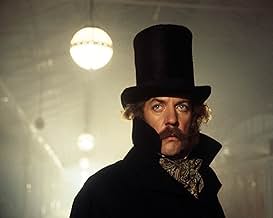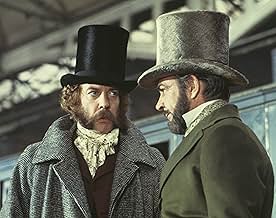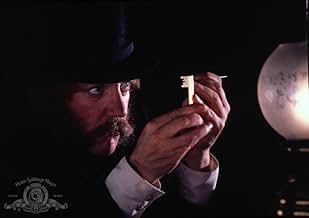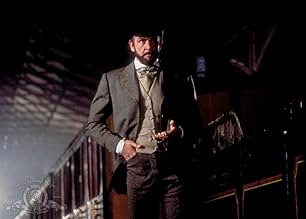Ein Meisterverbrecher will einen Zug einer großen Goldsumme berauben. Die Sicherheitsvorkehrungen sind streng, und die Aufgabe scheint unmöglich zu sein. Er hat jedoch einen Plan und genau d... Alles lesenEin Meisterverbrecher will einen Zug einer großen Goldsumme berauben. Die Sicherheitsvorkehrungen sind streng, und die Aufgabe scheint unmöglich zu sein. Er hat jedoch einen Plan und genau die richtigen Leute, um ihn auszuführen.Ein Meisterverbrecher will einen Zug einer großen Goldsumme berauben. Die Sicherheitsvorkehrungen sind streng, und die Aufgabe scheint unmöglich zu sein. Er hat jedoch einen Plan und genau die richtigen Leute, um ihn auszuführen.
- Auszeichnungen
- 1 Gewinn & 1 Nominierung insgesamt
- John - Trent's Butler
- (as Brian De Salvo)
- Judge
- (as Andre Morell)
Empfohlene Bewertungen
The performances are terrific, but the director and the late great Geoffrey Unsworth's delightful photography bring the Victorian Era back to life. The detail is wonderful in all the sets and surroundings.
The plot is very simple, the film is focused and I found myself rooting for the thieves!
The first two-thirds of the film is very slow and meticulous. I didn't mind this too much, though I am sure this will lose a lot of viewers. My suggestion is bear with it. First, it is well crafted. Second, the look of VIctorian London is wonderful....so take time to enjoy what you are seeing. The final portion is much more exciting and concerns the robbery itself. It's amazing to see Sean Connery doing his own stunts* and the footage is incredible...and it must have been incredible to see on the big screen.
Overall, a slow and deliberate movie that is great provided you don't mind the pace or that too much of the story is fictionalized in order to make the story more cinematic. The ending, in particular, is pure fiction and the real case, though interesting, is much different.
I do have two further comments. First, the sound on this DVD was abominable...with music that is so much louder than the dialog. You really do need the closed captions in order to watch the film....it's that bad. Second, one mistake I noticed is that the 'gold' in the film was ridiculously lightweight...and seeing Connery and Sutherland EASILY tossing the bags of gold off the train (as if they were filled with newspapers or scones) was silly.
*I know that they touted how Sean Connery did the insane stunt of climbing across the moving train and he clearly did. But in a few scenes, despite the hype, I do strongly suspect that a stuntman was occasionally used...such as when Connery's character is hanging off the sides of the moving train.
Based on a true incident , this intrigue-filled caper has been packed with suspense , thrills , action , stylish fun and hooks to keep interested . The film was entitled "The First Great Train Robbery" to distance it from a £2 million robbery from a mail train in 1963 which was known in the British press as "The Great Train Robbery" . The movie faithfully reflects some events of the Victorian era such as large differences of classes , public executions applauded by the assistants , carriage parades and many other things . Sensational trio protagonist who can steal your heart , as Sean Connery as a dashing mastermind , Donald Sutherland as a skill cracksman , and a gorgeous Lesly-Anne Down . Agreeable support cast such as Robert Lang , Michael Elphick , Alan Webb and Wayne Sleep ,one of Britain's premier ballet dancers, from The Royal Ballet Company , he actually did his own stunts, including scaling the Newgate prison walls, at the tremendous risk of falling and hurting himself . And it was the final film for both André Morell and Peter Butterworth, both of whom had died by the time that it was released . Thrilling and intriguing musical score by the great Jerry Goldsmith , director Michael Crichton frequently hired Jerry Goldsmith to compose the scores for his films . Colorful and evocative cinematography by Geoffrey Unsworth , in fact , the picture is dedicated to his memory ; being marvelously photographed against gorgeous Irish countryside . The motion picture was well directed by Michael Crichton . After giving up medicine, Michael moved to Hollywood, California, in the early 1970s and began directing movies based on his books, his first big break being ¨Westworld¨ (1973) and subsequently wrote and directed other successes as ¨Coma¨, ¨Runaway¨ and ¨13º warrior¨ until his early death by cancer at 66 years old .
A delightful period caper picture that's high on production value and fun characterisations. Split into two halves, Crichton's movie makes light of the actual crime to portray Connery and co as lovable rogues, thus hooking the viewer in to actually root for them to pull off the intricate crime. First half (well it's more two thirds of the film to be exact) details how the robbers obtained the four keys needed to get into the safe. Harder than it sounds since they are in different locations to one and other and guarded over by different officials. Naturally there are scrapes, skirmishes and obstacles to overcome during this complex operation, and no short amount of humour and tension either. Then it's on to the actual crime, which buzzes ferociously with derring do and ingenious cheek! It may have been loaded with chitter chatter and much bluffing of the way leading up to it, but the pay off is excellent and not without genuine excitement as Connery's (doing his own stunt work) Pierce and Sutherland's safe cracking Agar pull off the seemingly impossible.
Benefiting the film greatly is Crichton's attention to detail, where he thrives on the Victorian England setting. From the streets, the costumes, the dialogue and mannerisms of the characters, they all fit nicely within the narrative. Helps, too, that the cast are playing it with tongue in cheek, Connery and Sutherland are revelling in playing roguish dandies, splendidly attired facially with quality face fuzz and Down raises the temperature of Connery and male audience members alike. Probably her best ever performance, Crichton writes a good role for Down that sees her not only as a sexy head turner (it's unlikely that Victorian underwear has ever looked this sexy before in film), but also as an observant member of the gang; one who isn't too shabby on the disguise front either. Dancer Wayne Sleep is nicely cast as a fleet footed housebreaker, while Lang, Webb, Morell and Michael Elphick pitch their respective performances just right. Goldsmith's score is energetic and Unsworth's (his last film as he sadly passed away shortly after shooting it) photography is a lesson in quality without trickery.
Fanciful and tame if compared to the big budgeted actioners of today, The First Great Train Robbery none the less is testament that simplicity of plot and a keenness to entertain is sometimes all you need. 8/10
Sean Connery's character has decided for himself that he will pull off what no other thief has even properly attempted to do, namely steal a large amount of government gold from a massively secured safe on a moving train. He receives help from the lewd Lesley-Ann Down, who merely just uses her feminine charms and bodily trumps, and the self-acclaimed fastest key runner in the country; Donald Sutherland. Together they must figure out how to unnoticedly get hold of four separately secured keys to the safe, and then still find a solution to break into the guarded bank wagon and get out the loot. "The Great Train Robbery" reminded me very much of "Ocean's 11". I haven't seen the 1960 original, starring Frank Sinatra, but it isn't unthinkable that Steven Soderbergh also took some ideas from this film whilst he was preparing the 2001 remake. Connery's witty charms and small talks to infiltrate into high-society families, the grotesquely detailed schemes to plagiarize the keys, the acrobatic con-artist, the meticulously timed simulations, ... These are all scenes that could come straight out of "Ocean's 11".
"The Great Train Robbery" is a well-made, nicely acted and overall reasonably entertaining period film. It does have several defaults, though, notably that Crichton cannot seem to decide whether he wants his film to be a comical crime caper or a suspenseful heist movie. Certain parts are particularly bleak (like the dog-fighting, the execution, etc...) but mostly it's tongue-in-cheek, so the film kind falls in between genres. The Robin Hood styled ending also feels very forced. The Victorian costumes and decors look great, Jerry Goldsmith's score is exhilarating and both Sean Connery and Donald Sutherland put down pleasant performances, all of which still makes "The Great Train Robbery" recommended viewing!
Wusstest du schon
- WissenswertesWriter and director Michael Crichton based his book and movie only loosely on the actual crime committed in 1855. In real-life, there were four criminals: Pierce, Agar, the railway guard Burgess and a railway clerk named Tester. All four keys were kept on railway premises, two in London, and two in Folkestone. They were stolen temporarily by Tester and Pierce, respectively, so that Agar could duplicate them, but it turned out that the Folkestone keys were not being used anyway. The guard's van was not locked from the outside; Pierce and Agar were let in by Burgess and a share of the loot was handed out to Tester at stations. None of the criminals were spotted at once; it was several months before the railway conceded that the crime must have occurred on the train. The details came to light after Agar had been convicted in an unrelated crime and his accomplices decided to steal his share instead of using it, as he had asked, to provide his mistress an income. She got word to him and he turned Queen's Evidence against the others and told all. At no point in the case did anyone escape custody.
- PatzerIf the gold shipment was solely to pay British soldiers in Crimea, as asserted, it would have been in the form of barrels of gold coins, not gold bars as shown.
- Zitate
Judge: [Judgementally] Now, on the matter of motive, we ask you: Why did you conceive, plan and execute this dastardly and scandalous crime?
Edward Pierce: I wanted the money.
[the court spectators roar with laughter]
- Crazy CreditsCóras Iompair Éireann is misspelled in the end titles with an accent over the 'C' instead of the 'o'.
- Alternative VersionenUnder the terms of the Cinematograph Films (Animals) Act 1937 all UK versions of the film are cut by 32 secs with edits to a scene where a dog hunts and kills rats in a show arena ('ratting').
- SoundtracksI Dreamt I Dwelt in Marble Halls
(uncredited)
Music by Michael William Balfe
Lyrics by Alfred Bunn (1843)
Heard on violin offstage in bordello
Top-Auswahl
Everything New on Prime Video in July
Everything New on Prime Video in July
Details
- Erscheinungsdatum
- Herkunftsland
- Sprachen
- Auch bekannt als
- Der erste große Eisenbahnraub
- Drehorte
- Cork Kent station, Glanmire Road, Cork, County Cork, Irland(Brighton station)
- Produktionsfirmen
- Weitere beteiligte Unternehmen bei IMDbPro anzeigen
Box Office
- Budget
- 6.000.000 $ (geschätzt)
- Bruttoertrag in den USA und Kanada
- 13.027.857 $
- Eröffnungswochenende in den USA und in Kanada
- 391.942 $
- 4. Feb. 1979
- Weltweiter Bruttoertrag
- 13.027.857 $
- Laufzeit1 Stunde 50 Minuten
- Farbe
- Seitenverhältnis
- 1.85 : 1























